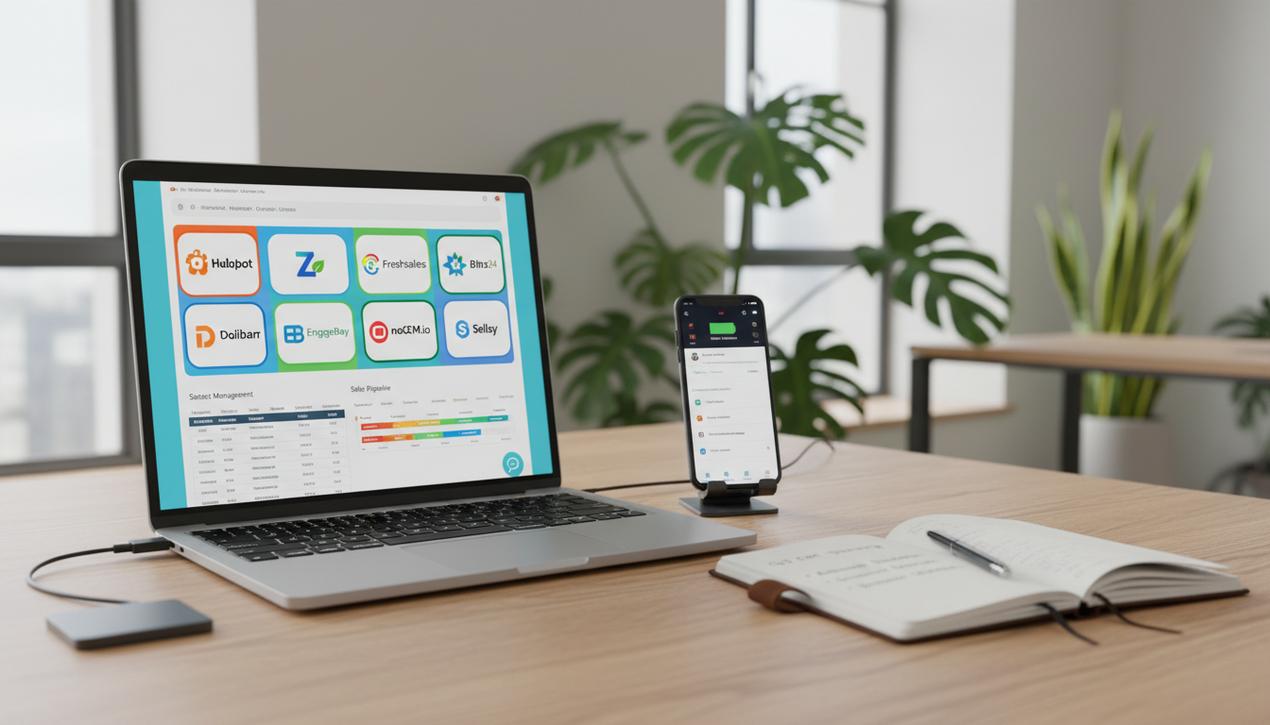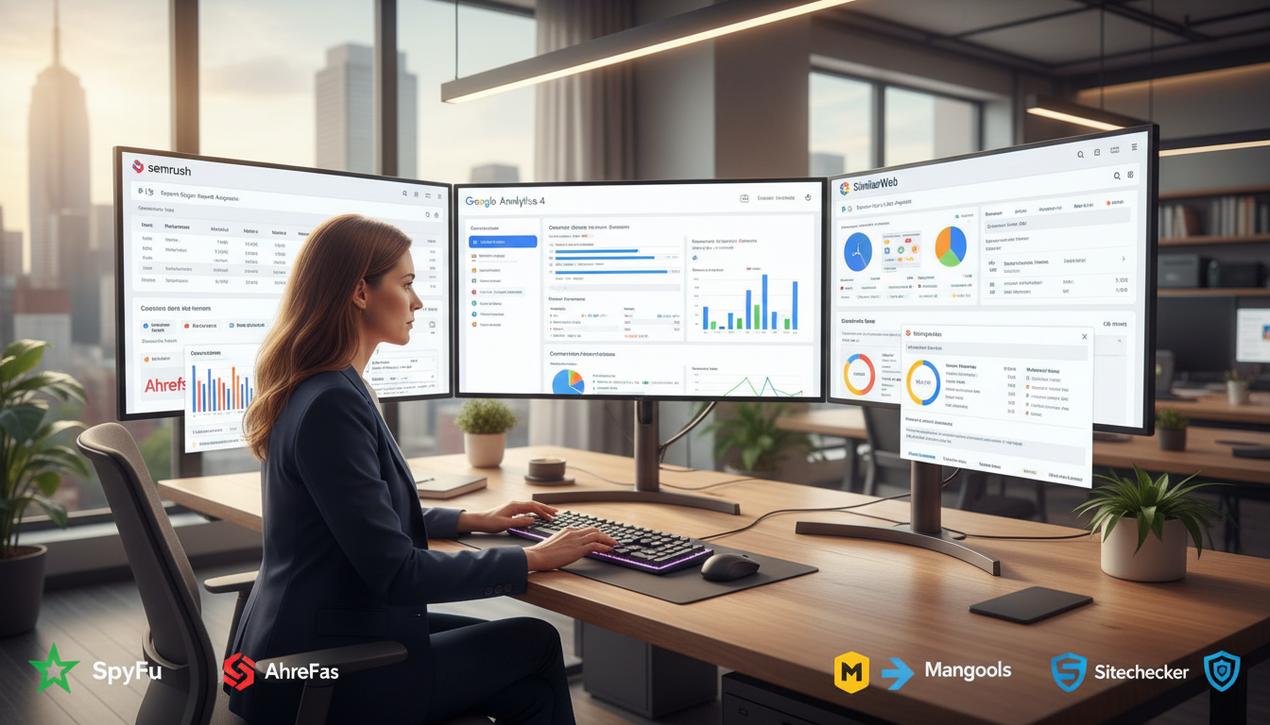The Ultimate Guide to the Best Free CRM Software in 2025


In an increasingly competitive business environment, customer relationship management has become the cornerstone of any successful enterprise. A CRM (Customer Relationship Management) software is no longer a luxury reserved for large multinational corporations, but an essential strategic tool for small businesses, startups, and freelancers. The global CRM market is projected to exceed $157 billion by 2030, a testament to its critical importance. A well-implemented CRM can generate an impressive return on investment, reaching up to $8.71 for every dollar spent. However, the cost of premium solutions can be a significant barrier for new or budget-conscious businesses. Fortunately, the market has evolved to offer a multitude of powerful and robust free CRM software options. Far from being simple digital address books, these tools provide advanced features to manage contacts, track sales pipelines, and automate tasks. This comprehensive guide presents the best free solutions available in 2025 and gives you the keys to choosing the one that will drive your growth.
Top 19 Free CRM Software Solutions to Consider in 2025
Choosing a CRM requires careful consideration. To help you, we have selected the most complete and reliable free platforms on the market, each tailored to specific needs.
1. HubSpot CRM
Widely regarded as the undisputed leader in free CRMs, HubSpot offers an incredibly generous solution. Its free plan is designed to support business growth indefinitely.
- Key Features: Unlimited contact and company management (up to 1 million records), email tracking and notifications, sales pipeline management, meeting scheduling, live chat, and basic reporting.
- Ideal For: SMBs and startups seeking an all-in-one, scalable solution to align their marketing, sales, and customer service teams.
2. Zoho CRM
Zoho offers a comprehensive suite of professional tools, and its CRM is no exception. The free version is designed for small teams and provides the essential features to get started.
- Key Features: Lead, contact, and account management, workflow automation, standard reports, document management. The free plan is limited to 3 users.
- Ideal For: Small businesses that need a simple tool to structure their sales process and may potentially use other products from the Zoho ecosystem.
3. Freshsales (from Freshworks)
Freshworks provides a suite of tools known for its user-friendly design. Freshsales is its dedicated CRM, featuring an attractive free plan and a highly intuitive user interface.
- Key Features: Contact and account management, activity tracking, a visual sales pipeline, built-in phone (requires credit purchase), chat, and 24/5 email support.
- Ideal For: Small businesses and sales teams that prioritize simplicity and rapid onboarding to manage their customer interactions.
4. Bitrix24
Bitrix24 is much more than a simple CRM. It is a complete collaboration platform that integrates project management, communication, and sales. Its free plan is one of the most generous in terms of user count.
- Key Features: Unlimited users, a full-featured CRM (contacts, deals, quotes, invoices), project management (tasks, Kanban), an omnichannel contact center, and a website builder.
- Ideal For: Companies looking for a centralized solution to manage not only their customers but also their entire internal operations.
5. monday sales CRM
Known for its visual project management tools, monday.com has developed a powerful and fully customizable CRM. The free plan is limited but allows users to test the tool’s flexibility.
- Key Features: Contact and lead management, web forms for lead capture, customizable dashboards. Limited to 2 users and 1,000 contacts.
- Ideal For: Teams that love visual, modular interfaces and want a CRM that adapts perfectly to their unique sales process.
6. EngageBay
EngageBay positions itself as an affordable alternative to HubSpot. Its all-in-one platform combines marketing, sales, and customer service with a very comprehensive free plan.
- Key Features: Contact management (up to 250), email marketing, automated sequences, landing pages, deal management, and appointment scheduling.
- Ideal For: Startups and solopreneurs who need marketing automation tools integrated into their CRM without breaking the bank.
7. SuiteCRM
For fans of open-source solutions, SuiteCRM is a robust and fully customizable alternative to the market giants. It requires self-hosting but offers complete freedom.
- Key Features: A 360-degree customer view, sales management, a customer portal, marketing automation, and advanced reporting. Completely free with no user or contact limits.
- Ideal For: Companies with in-house technical skills that want total control over their CRM and data.
8. Dolibarr
Dolibarr is another heavyweight in the open-source world. It is a modular ERP/CRM that allows you to activate only the necessary features, from customer management to accounting.
- Key Features: Prospect and customer management, product/service catalog, management of commercial proposals, orders, invoices, and even inventory management.
- Ideal For: Small businesses, associations, and freelancers looking for a comprehensive and free business management tool that goes far beyond a simple CRM.
9. noCRM.io
As its name suggests, noCRM.io is not a traditional CRM. It is a lead tracking tool designed by and for salespeople, focusing on action and conversion.
- Key Features: One-click lead creation (from LinkedIn, email, etc.), a visual sales pipeline, automatic reminders, and prospecting lists. The tool is not free but offers an extended trial.
- Ideal For: Sales teams that find traditional CRMs too cumbersome and want a tool 100% focused on converting prospects into customers.
10. Sellsy
Sellsy is a complete French CRM suite that covers the entire customer lifecycle. It integrates sales, marketing, invoicing, and cash management tools.
- Key Features: Centralized contact database, opportunity management, email and SMS campaigns, automated invoicing and reminders, customer support. Offers a free trial.
- Ideal For: European SMEs looking for an integrated solution with local support and features tailored to the European market.
Other Excellent Options to Explore:
- 11. Capsule CRM: A simple and effective tool, perfect for small businesses wanting to start organizing their contacts and sales.
- 12. Agile CRM: An all-in-one solution combining sales, marketing, and service, free for up to 10 users.
- 13. Vtiger: A powerful open-source version that offers a 360-degree customer view and numerous integrations.
- 14. EspoCRM: A modern and fast open-source CRM with a pleasant and customizable interface.
- 15. CiviCRM: The open-source standard for non-profit organizations and associations.
- 16. Axonaut: A French CRM designed for small businesses, combining CRM, quotes, invoicing, and accounting.
- 17. Initiative CRM: A solution hosted in France, focused on automation and data synchronization.
- 18. Crème CRM: A very complete open-source French CRM developed by a team from Marseille.
- 19. Sendinblue (Brevo): Known for its email marketing, Brevo offers a highly effective free CRM module to centralize customer interactions.
How to Choose the Right Free CRM for Your Business
Faced with this multitude of options, it is easy to feel lost. An ill-suited CRM choice is a key reason why nearly 50% of CRM implementation projects fail. Before committing, it’s vital to remember that many businesses start by mastering tools like Google Sheets before they need a dedicated CRM. To make the right choice, follow this 7-step methodology.
1. Accurately Assess Your Current and Future Needs
List the essential features for your team today. Do you need to track a sales pipeline? Manage marketing campaigns? Provide customer support? Also, think about tomorrow. Is your team going to grow? Will you need more advanced features in a year?
2. Analyze the Limitations of the Free Plan
This is the most critical point. A “free” CRM always has limits. Carefully scrutinize:
- The number of users.
- The number of contacts or records.
- Restricted features (advanced reporting, automation, etc.).
- The presence of mandatory branding from the provider.
3. Test Ergonomics and Ease of Use
A CRM is only useful if it is used. Take advantage of trial versions to invite your team to test the platform. Is the interface intuitive? Are daily tasks quick to perform? A simple onboarding process ensures a high adoption rate.
4. Check Integration Capabilities
Your CRM must integrate seamlessly with your existing tools: email (Gmail, Outlook), calendar, marketing automation tools, e-commerce platform, etc. Good integration avoids double data entry and ensures data consistency.
5. Consider the Solution’s Scalability
The free plan is a starting point. Research the paid offerings. Are the prices transparent and affordable? Is upgrading simple? Choosing a CRM is a long-term investment.
6. Ensure Compliance and Data Security
If you process data from European citizens, compliance with the General Data Protection Regulation (GDPR) is non-negotiable. Verify that the CRM provider offers clear guarantees on this point, especially regarding server location and consent management tools.
7. Consult Reviews and Community Support
Free plans generally do not include dedicated customer support. You will therefore depend on online documentation, community forums, and tutorials. Check if the community is active and if the available resources are high quality.
Key CRM Trends for 2025 and Beyond
The world of CRM is constantly evolving. In 2025, several major trends are transforming how businesses interact with their customers.
Artificial Intelligence at the Service of Performance
AI is no longer a gimmick. It is now integrated into the core of CRMs to automate complex tasks, a trend explored in our guide to AI in the enterprise. This includes predictive lead scoring to prioritize sales efforts, sentiment analysis in customer emails, action suggestions based on interaction history, and intelligent chatbots for 24/7 customer service.
Hyper-Personalization of the Customer Experience
Customers expect tailored interactions. Modern CRMs centralize all data—purchase history, website behavior, social media interactions—to create unique customer journeys and deliver highly targeted offers and communications.
The Crucial Importance of Mobile CRM
Sales teams are increasingly mobile. Fluid and complete mobile access to a CRM is essential. Statistics show that sales productivity increases by nearly 15% when sales reps have mobile access to their CRM. Choosing a solution with a high-performing mobile app is therefore a critical criterion.
Choosing a free CRM software in 2025 is a strategic decision that can significantly accelerate the growth of small and medium-sized businesses. Solutions like HubSpot or Bitrix24 offer features that were once the exclusive domain of software costing thousands of dollars. The key is not to rush and to conduct a thorough analysis of your own needs before committing. A free CRM, however powerful, has its limits, and it is crucial to understand when and why upgrading to a paid plan will be necessary. By adopting a methodical approach and choosing a tool aligned with your ambitions, you will lay a solid foundation for a lasting and profitable customer relationship.




